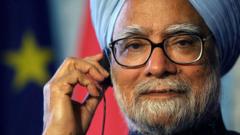The recent passing of Manmohan Singh on Thursday has sparked an outpouring of tributes for the former prime minister, known to many as a “kind and soft-spoken” leader. His state funeral will take place on Saturday, and the Indian government has declared seven days of mourning in his honor. Despite holding key positions as the governor of the Reserve Bank of India and federal finance minister, Singh was often viewed as a reluctant politician, more interested in results than the spotlight. He was instrumental in launching pro-market reforms that drastically changed India’s economy, earning both admiration and criticism throughout his political journey. His commitment to cautious leadership remained unwavering, as did his reputation for being relatable amid a high-octane political environment.
Remembering Manmohan Singh: A Gentle Giant of Indian Politics

Remembering Manmohan Singh: A Gentle Giant of Indian Politics
Manmohan Singh, India’s former prime minister, is remembered for his quiet leadership style and significant contributions to the nation, leaving behind a legacy of integrity and resolve.
Born into a humble background in what is now Pakistan, Singh was India’s first Sikh prime minister and overcame significant obstacles to earn two degrees from prestigious universities, Cambridge and Oxford. In a brave move, he apologized to the Sikh community for the 1984 riots, an action that garnered respect across party lines and showcased his compassionate leadership. Singh’s term saw monumental achievements, such as the landmark nuclear deal with the US, despite facing significant opposition and criticism. However, his leadership was ultimately challenged by accusations of corruption and public pressure, particularly during crises such as the 2008 Mumbai terror attack.
Controversies plagued his second term, leading to criticism of his handling of public grievances, particularly regarding rising corruption and declining economic growth. Nonetheless, Singh maintained his dignity, often preferring to stay out of the political fray. In a rare moment of openness, he stated that he believed history would judge him favorably despite contemporary criticisms, a sentiment that resonates even as India reflects on his unique yet impactful leadership style.
In the face of diverse challenges, Singh’s legacy remains one of a thoughtful leader who prioritized the nation’s welfare, earning him a lasting place in the hearts of many Indians as a leader of steely resolve wrapped in gentleness.
Controversies plagued his second term, leading to criticism of his handling of public grievances, particularly regarding rising corruption and declining economic growth. Nonetheless, Singh maintained his dignity, often preferring to stay out of the political fray. In a rare moment of openness, he stated that he believed history would judge him favorably despite contemporary criticisms, a sentiment that resonates even as India reflects on his unique yet impactful leadership style.
In the face of diverse challenges, Singh’s legacy remains one of a thoughtful leader who prioritized the nation’s welfare, earning him a lasting place in the hearts of many Indians as a leader of steely resolve wrapped in gentleness.






















